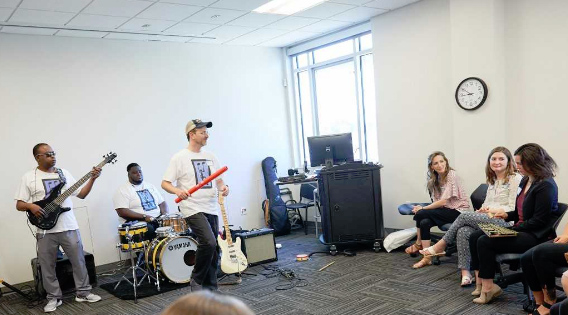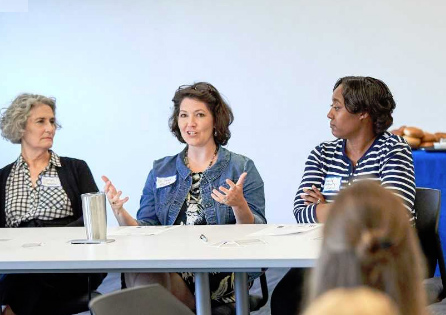School of Communication Sciences and Disorders
Interprofessional Education Class Brings Together Students Across Health Disciplines
by Corey Fawcett
For even the most educated of parents, navigating the healthcare system on behalf of a child with multiple medical needs can be an extremely daunting task.
 "We're asking a parent to interpret results and integrate recommendations from a number
of different professionals, and that's hard even for professionals to do," Dr. Naomi
Eichorn said. "We need a way to coordinate the care we're providing to make it a more
efficient process that doesn't rely on a parent to put all the pieces together."
"We're asking a parent to interpret results and integrate recommendations from a number
of different professionals, and that's hard even for professionals to do," Dr. Naomi
Eichorn said. "We need a way to coordinate the care we're providing to make it a more
efficient process that doesn't rely on a parent to put all the pieces together."
And ASHA agrees. The association is beginning to emphasize interprofessional education (IPE) more in their accreditation standards, and Eichorn sees good reason for that. That's why she spearheaded the school's first IPE class, funded through a UM Community of Research Scholars grant.
"We need to understand other professions in order to work effectively as a team," she said. "Students [across healthcare professions] don't really learn much about other professions in school, but suddenly they're required to interact when they enter the workforce. We're trying to provide that kind of training beforehand."
The class included students from UofM's speech-language pathology, audiology, public
health, nursing programs, and from the  Southern College of Optometry. The first activity they did together in person required
them to communicate using musical instruments. According to Eichorn, the students
were hesitant at first but ended the activity laughing and "communicating" with each
other. They made a connection between the activity and the challenges of working together
across professions.
Southern College of Optometry. The first activity they did together in person required
them to communicate using musical instruments. According to Eichorn, the students
were hesitant at first but ended the activity laughing and "communicating" with each
other. They made a connection between the activity and the challenges of working together
across professions.
"If you're thinking about interprofessional practice, the language that can sometimes divide us is other professions' jargon," Eichorn said. "We want to use the terms we studied but that can keep us from communicating effectively."
After the ice breaker was a community panel that included parents of children with autism who shared their experiences accessing multiple healthcare professionals on a regular basis. A patient representative who helped parents navigate the healthcare system also spoke, as well as a social worker who spoke about resources health profession students should be aware of in the Memphis community.
Students later broke into small groups and participated in hands-on case simulations with live standardized actor-patients. They worked as a team to interact with the "parent" and determine how they could best address their concerns.
"There was actually a lot of flow in the interactions," Eichorn said. "The students worked without a lot of explicit structure but they seemed to know how to make the interaction a group process."
Eichorn is hoping this pilot course will serve as a seed that will grow into further interprofessional education opportunities at the University of Memphis for students going into healthcare.
"Students need to simultaneously develop professional identities and their identities as members of a team from the very beginning," Eichorn said. "We must recognize that they're parallel identities."
